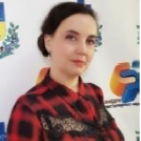
Mariia Talakh
Work place: Yuriy Fedkovich Chernivtsi National University/Computer Science Department, Chernivtsi, 58002, Ukraine
E-mail: m.talah@chnu.edu.ua
Website:
Research Interests: Environmental Engineering, Modeling, Pattern Recognition, Machine Learning, Computer Vision
Biography
Mariia Talakh: Assistant Professor of Computer Science Department, Chernivtsi National University, Ukraine. Ph.D. in Biological Sciences. Received her Master's degrees in Ecology and System Analysis (Computer Systems Analyst). Field of scientific interests: Data Mining and Analysis, Computer Vision and Pattern Recognition, Machine Learning Algorithms (focusing on ensemble models), Application of AI and ML in Life Sciences, Modeling of Environmental Processes.
Author Articles
Intelligent System for Recognizing Tone and Categorizing Text in Media News at an Electronic Business Based on Sentiment and Sarcasm Analysis
By Danylo Holubinka Victoria Vysotska Serhii Vladov Yuriy Ushenko Mariia Talakh Yurii Tomka
DOI: https://doi.org/10.5815/ijieeb.2025.01.06, Pub. Date: 8 Feb. 2025
During the implementation of the work on the creation of the system of tonality recognition and text categorization in the news, a study of the subject area was conducted, which allowed the understanding of the processes of text analysis in the mass media to be enriched. The necessary data for further processing was found. The work resulted from a program that consists of an information parser, a data analyser and cleaner, a Large Language Models model, a neural network, and a database with vectorized data. These components were integrated into the user interface and implemented as a program window. The program can analyse news texts, determining their tone and categories. At the same time, it provides the user with a convenient interface for entering text and receiving analysis results. Therefore, the created system is a powerful tool for automated analysis of textual data in mass media, which can be used for various purposes, including monitoring the news space, analysis of public opinion, and others. Also, the developed information technology successfully meets the set tasks aimed at tonality analysis and categorization of news. It effectively solves the task of collecting, analysing and classifying news materials, which allows users to receive operational and objective information. Its architecture and functionality allow for easy changes and additions in the
future, making it a flexible and adaptable tool for news analytics and decision-making in various business sectors.
Modeling and Development of a Computer Simulator with the Formation of Working Scenarios for Training Operator Personnel in the Search for Objects
By Taras Basyuk Andrii Vasyliuk Yuriy Ushenko Dmytro Uhryn Zhengbing Hu Mariia Talakh
DOI: https://doi.org/10.5815/ijmecs.2024.04.07, Pub. Date: 8 Aug. 2024
The article is dedicated to solving the problem of modeling and developing a computer simulator with the creation of working scenarios for training operating personnel in object detection. The analysis of the features of human operator activity is carried out, the model of his behavior is described, and it is shown that for the presented task, the following three levels must be taken into account: behavior based on abilities (skills), behavior based on rules, behavior based on knowledge. User models that are used in man-machine systems were created, and their use in the process of modeling operator activity from the point of view of regular and irregular exposure was shown. This made it possible to create a prototype of a graphical window using a user-friendly interface. A system model of human-machine interface for processing and recognition of visual information is mathematically described and a model of image representation based on three possible scenarios of their formation is formed. The result of the study was the software implementation of an effective educational tool prototype that accurately replicates real-world conditions for the formation of working scenarios. The conducted experimental research showed the possibility of general image recognition tests, selection of different test modes, and support for arbitrary sets of image test tasks. Further research will be aimed at expanding the
functionality of the created prototype, developing additional modules, automatically generating scenarios and verifying work.
Other Articles
Subscribe to receive issue release notifications and newsletters from MECS Press journals